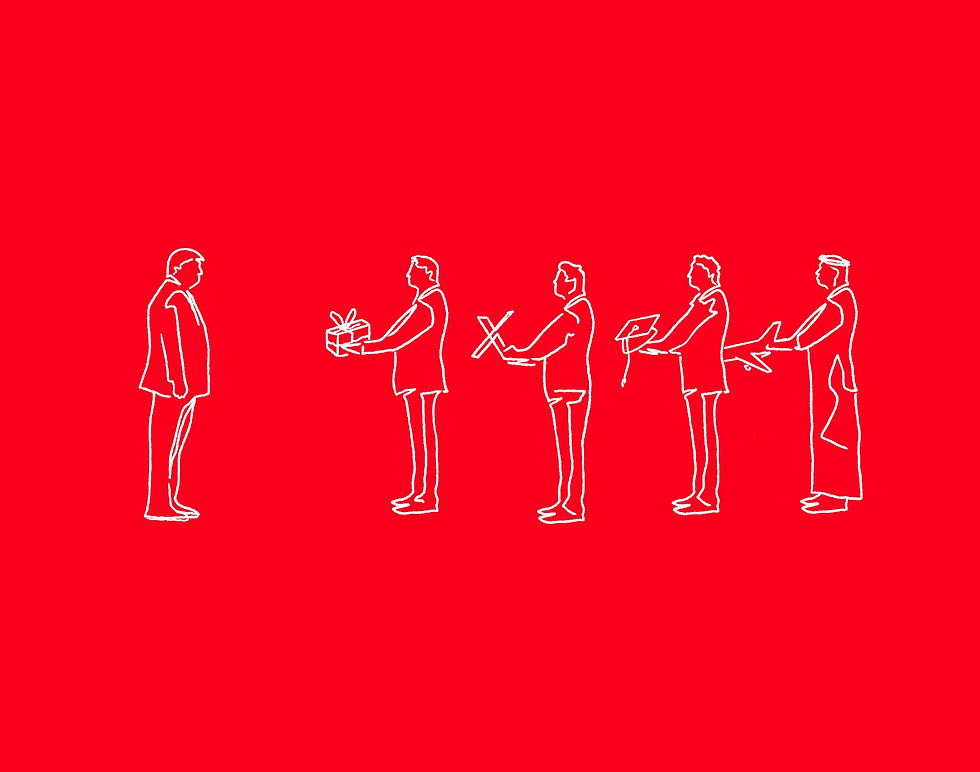When Diplomacy Meets Bromance: Trump's New Domestic and Foreign Play
- Isabel Rodriguez

- Jul 18, 2025
- 4 min read
Updated: Jul 20, 2025

Some things have remained a constant in the second Trump term: his capricious and avaricious personality, which prioritises loyalty, business negotiations, and media spectacle, continues to define his approach toward diplomacy and America’s global positioning. Within his approach toward the presidency and politics, Trump continues to blend the roles of showman, strongman, and salesman, constructing his policy agenda within the framework of transactional politics.
On Inauguration Day, tech billionaires flocked to the Capitol Rotunda as guests of President Trump. The attendees alone represented over $1.2 trillion in collective wealth, with images showing Meta CEO Mark Zuckerberg near Amazon CEO Jeff Bezos, Google CEO Sundar Pichai, and Tech leader Elon Musk. This united Silicon Valley front symbolised more than tech interests in the Trump administration, but it set the foundation for what Trump’s first 100 days in office would be defined as: bromance.
Among the names, Elon Musk, CEO of Tesla and SpaceX, and owner of X (formerly Twitter), emerged as the symbol of this newly formed tech oligarchy. His close and public relationship with Trump led him to become a Senior Advisor to the President of the United States
and lead the new Department of Government Efficiency. Building a government department similar to a tech start-up, Elon cemented himself into the expanding administration and began to make a name for himself in MAGA politics. Dubbing himself as the “first buddy” on the campaign trail and then being inseparable once in office, spending time with each other “almost every day,” Trump’s relationship with Musk can only be described as a bromance powered by attention-seeking, i.e. only until something flashier and shinier comes along.
On May 21, Trump shocked the world by accepting a luxury Boeing 747 jetliner from Qatar as a gift. Seeking to turn it into Air Force One, a change that would require $1 billion in changes, sparked not only outrage amongst lawmakers across the aisle but ignited a conversation surrounding Trump’s ability to be dazzled, with some reports going as far as to say he “is for sale to the highest bidder.” While Qatar denies “any intention of using the transaction as part of an influence campaign,” the administration ultimately signed a historic $1.2 trillion Economic Commitment to Qatar, which included the Boeing aircraft gift. Trump’s longstanding relationship with Qatar Airways CEO Akbar al-Baker further underlines this quid pro quo, as Qatar Airways, Emirates Airlines, and Etihad Airways have continued to receive government subsidies.

Switching to domestic plays, Trump’s immigration draconianism is driven not only by his base’s enthusiasm for the policy, but also by his affinity for modelling strongman leaders, such as Nayib Bukele, President of El Salvador. A leader who calls himself the "world's coolest dictator," Bukele's close relationship with Trump is an immediate cause for concern, but it is on par with Trump’s authoritarian ambitions. We see this bromance come to life when talking about incarceration.
“I have a great relationship with this man,” Trump said at one point, during Bukele’s state visit. “I have the best relationship with him.”
Trump and his administration have suggested not only utilising El Salvador’s prisons for immigration enforcement, as in the case of Kilmar Abrego Garcia, but they have also discussed their applications to US “homegrown” criminals. This bromance, bonded through an ultimate narcissism and authoritarian appreciation for law and order, the consolidation of power, and villainisation of political enemies, is a facet that, on the world stage, is detrimental to democracy and the liberal order. Yet, for Trump’s policy, which seeks to emulate Bukele’s “iron-fisted playbook”, this is the exact relationship that will ensure limited government oversight and unchecked power.
“Trump likes to be flattered, and Bukele is one of his biggest fans,” Benjamin Gedan, a former director on the White House National Security Council, told Crooked Media’s What A Day podcast.
When it comes to Trump and forming a connection, world leaders have begun to catch on to these trends. While some leaders, such as former Canadian Prime Minister Justin Trudeau, have not earned good graces, others have played the game. U.K. Prime Minister Keir Starmer’s first White House talks with Trump showcased just that.
“These visits are like a first date,” said one senior U.K. official, who told Politico regarding Keir Starmer’s first White House talks with Donald Trump. “You go and just hope you might get married someday.”
Between praising Starmer’s “beautiful accent” and claiming they “get along famously,” the Trump and Starmer bromance is one that, while unexpected, will prove crucial. Given the recently negotiated trade deal, marking the first country to strike such an agreement with him, several key components critical to the diplomatic relationship remain unanswered, such as the UK's tariffs on steel and aluminium, Iran’s nuclear program, and international security. Yet, after calling him a “friend” at the G7 summit, this relationship seemingly signals Trump’s ability to forge connections with those unlike himself, offering a glimmer of hope within this otherwise negative personalism afflicting today’s American diplomacy.
Illustration by Will Allen/Europinion
.png)



Comments